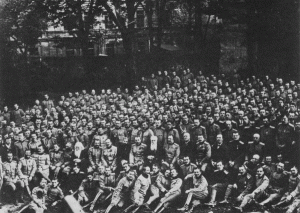Flora Sands: The Woman who fought in World War One
Flora Sands was the only British woman to fight as an active combatant in the First World War.
She was born in Yorkshire on January 22nd, 1876. Her early childhood was spent in County Cork, where her father was a minister of the church. When she was nine, the family moved to Marksford, Suffolk and then on to Thornton Heath in Croydon, Surrey. Flora was educated by a series of governesses. She enjoyed shooting and horse riding, finding the constraints of an Edwardian childhood frustrating and wearisome. But, typically of other enterprising young women of the time, she learned to drive an old French racing car, whilst also holding down a job as secretary and spending her spare time learning first aid, forming an all women’s paramilitary organisation, learning horsemanship, signalling and army drill.
In 1910 she and a like-minded American, Mabel St. Clair Stolart, got together a group of adventure-seeking women to serve on the Serbian Front during the first Balkan War (October 1912 – May 1913), the most brutal and dangerous territory in Europe.
In 1914 she volunteered to become a nurse, but was rejected as she had no medical training. Instead she joined the St. John Ambulance Unit formed by an American nurse also serving in Serbia. They made for the headquarters of the Serbian army, which was fighting the Austro-Hungarians. Flora than joined the Serbian Red Cross, serving as an ambulance driver in the Second Infantry Regiment of the Serbian Army.
The Serbian Infantry were forced to conduct a fighting retreat into Albania, and in the chaos Flora became separated from her unit. She promptly enlisted as a combat soldier with the retreating Serbian forces and was soon promoted to the rank of Corporal, becoming the only British woman to take an active part in front-line combat during the Great War.
By 1916 the Serbian army had advanced into Monastir, where Flora was seriously wounded by a grenade whilst taking part in fierce hand-to-hand fighting. She was awarded the highest Serbian decoration for bravery here, and was again promoted, this time to the rank of Sergeant Major. By the end of the year Flora had to cease active fighting due to her injuries. Instead she ran a hospital on the front line. In 1922 she was demobilised with the rank of Captain.
In 1927 she married a Russian Gneral, lived in France for a short while, then settled in Belgrade, where she drove a taxi cab around the city, as well as writing her autobiography and lecturing all over the world.
In 1940 she was interned by the Germans. In September of 1944 her husband fell ill and died. Flora returned to Suffolk at the end of World War Two and died in 1956, aged 80, having lived a rich and adventurous life.

